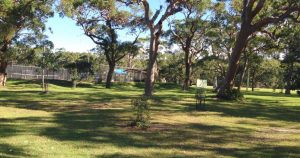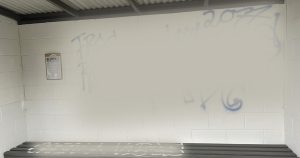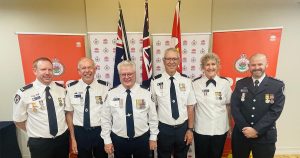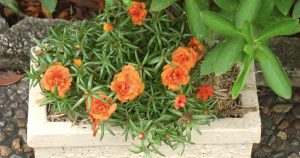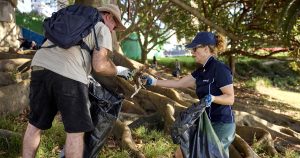By Barry Lees - Still Creek Landcare
Some weeks ago we had Unusual Visitors – three of them. They came without warning and settled in, ate for three weeks until there was nothing left, then left without a word of thanks.
Strangely, we were delighted! We enjoyed their company and felt privileged that they had chosen us. The visitors were Glossy Black Cockatoos, rare and beautiful birds. They are big, black (but not glossy), with rich red under their tail feathers. Females also have some yellow on their neck. They mate for life and usually feed in threes – mum, dad and the kid. They came early each morning, and left about 5pm, spending the whole day quietly eating seeds from a tree near our kitchen window. We had seen them occasionally before, but they had only ever stayed a couple of days. This time they stayed for 3 weeks until the tree was almost bare.
They feed on seeds of sheoak trees, also known as casuarinas. The seed pod is about 1 cm round and 2 cm long, with 50 or so seeds held in small pockets on the surface of the pod. They bite the pod off the tree branch, hold it in their left hand and somehow remove the tiny seeds with their big beak and tongue. It’s like separating pepper and salt with boxing gloves on.
Despite their size, they are peaceful birds. You can walk around underneath them, do some gardening and talk to them. They just crunch away and make occasional contented squeaks to each other – totally opposite to their raucous white cockatoo cousins.
Now they have gone I feel a bit sad. I hope they come back sometime after the tree has produced more seeds. There are so few of these birds left, they are classified as “vulnerable”. I urge residents to help by planting more casuarinas. Don’t be like a man I spoke to recently who said “Oh them Casuarinas, they’re just bloody weeds. I cut ‘em all out.” There are 5 casuarina species in this area. You should plant Allocasuarina littoralis, sometimes called black casuarina or black sheoak. Hornsby, Hills or Hawkesbury Council nurseries should have them.
Glossy Blacks breed in large tree hollows which are also getting hard to find. If you can avoid it, please don’t cut down live or dead trees that have tree hollows. They are so valuable to all our wildlife.
For further information about Landcare, contact Nick on 9653 2056, or email [email protected] or visit Still Creek Landcare at http://www.stillcreeklandcare.com.au or on Facebook.
Unusual Visitors Unusual Visitors Unusual Visitors Unusual Visitors Unusual Visitors


